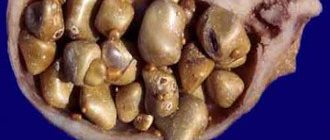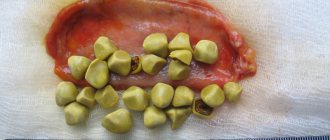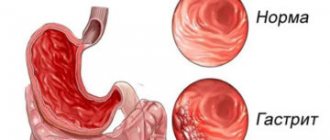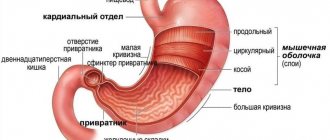Very hard stool
Excessively hard feces is a pathology, since it cannot leave the intestines and remains in the body, thereby poisoning it. If the urge to defecate occurs, it causes severe pain, which a person cannot always cope with on his own. In addition, if part of the feces does leave the body, there may be a feeling of incomplete bowel movement - this is also a sign of disorders.
Excessively hard feces is a pathology because it cannot leave the intestines and remains in the body, thereby poisoning it.
The reasons for the formation of hard feces are the following factors:
- lack of fiber in the diet: (if a person mainly eats meat products and semi-finished products, this affects the formation of excessively dense feces);
- pregnancy; (hormonal changes and stress on the intestines often cause constipation in expectant mothers);
- insufficient fluid intake; (if a person drinks too little clean water, this leads to intestinal dysfunction);
- diseases and inflammations of the gastrointestinal tract;
- sedentary lifestyle: (if a person moves little himself, then the movement of feces in the intestine stops);
- side effects of certain medications.
If feces do not leave the body for more than seven days, this leads to surgery and major complications.
Very hard stool does not pass
Normally, a person's intestines form tight and dense feces. At the exit into the rectum, it already has an even denser state. Thick poop that is relatively dense is normal for humans. If it’s a little softer, then this is also normal, since each person’s stool will have its own shape (the stool may be soft or slightly hardened, but not stone-like).
If the stool is hard and does not come out of the rectum, if it is stuck in the small or large intestine, then this is constipation. Constipation is characterized by the fact that the first portion is hard, followed by soft but thick feces. If the formed fecal lump does not completely come out of the rectum, causes discomfort and pain, and after the act of defecation feels incomplete, then this also indicates pathology.
Another sign of constipation is stool that looks like sheep poop, or stool that looks like rocks. If stool is stuck, and then a fecal plug comes out of the intestine during a bowel movement with straining, and then liquid stool comes out, then this is not diarrhea; this phenomenon is also observed with constipation.
Very often, men and women suffer from a very sensitive and delicate problem - they are unable to go to the toilet normally
It is important to break up hardened stool in the intestines before a large lump forms in the rectum, causing an intestinal obstruction that can only be corrected by surgery.
Getting rid of fecal impaction
If you have intestinal obstruction due to fecal stones, a regular therapist or gastroenterologist will not help. Feel free to make an appointment with a proctologist, preferably one with experience in surgical operations. Remember that the sooner you get to the doctor's office, the more likely it is that the problem will be resolved quickly and with a guaranteed result.
The first point of any treatment is a thorough diagnosis. The doctor can feel large fecal plugs that have formed over a long period of time with their fingers. Usually, palpation of the abdomen or rectum during a rectal examination is sufficient for this. If the fecal stones are small, perhaps there are several of them, then the patient will undergo an x-ray or ultrasound. If the fecal impaction is localized in the large intestine, a colonoscopy is performed. The doctor must also exclude the possibility of tumors and deforming intestinal pathologies, which often provoke obstruction without the formation of hard feces.
It is possible to soften fecal impaction in an adult or child without surgery. But this is real if the disease is not advanced to an extreme stage. In this case, there will be little hope for mild laxatives (like rectal suppositories). You will need the good old classic: softening the fecal plug with an enema.
You can get rid of fecal impaction at home, but ideally, of course, the procedure should be carried out in a hospital under the strict guidance of a doctor. You will need an Esmarch mug; add glycerin, hydrogen peroxide or petroleum jelly to regular water. These components are needed to soften the accumulation of feces. If you can't go to the hospital for an enema, talk to your doctor. He will give you recommendations on how to avoid damaging the intestinal wall with the enema tip and causing bleeding.
From the range of pharmacies for removing fecal stones, we are interested in microenemas: “Norgalax”, “Microlax”, preparations with glycerin. They will help soften the fecal impaction, but they (especially Norgalax) should not be used without consulting a doctor. Here are the contraindications for microenemas:
- anorectal bleeding;
- nausea and vomiting;
- pregnancy and breastfeeding;
- for fecal impactions in children.
Traditional medicine has its own view on softening fecal stones. For an enema, take a herbal decoction of linden, chamomile and motherwort. You can add beet or potato juice, vinegar (no more than 6%) to it. But it’s still better to be careful and not get carried away with unconventional recipes, because vinegar is not the best friend for the rectum.
Similar article - Medicine Khairabezol instructions
Very hard stool in an adult
Very often, men and women suffer from a very sensitive and delicate problem - they are unable to go to the toilet normally. And the reason for this is hard feces, which appears with a seemingly normal diet, visible physical health and the usual rhythm of life.
Hard stool in adults may be caused by poor diet. The diet contains few foods rich in coarse fiber, which stimulates the intestines and promotes the elimination of waste and toxins in the feces. Also, a sedentary mode of work and low physical activity lead to improper functioning of the entire gastrointestinal tract, intestinal motility decreases, motor and transport functions are impaired, which leads to constipation.
Hard stool in adults may be caused by poor diet.
Exposure to stress, nervous stress, causing depression. In such cases, the entire body works in “emergency” mode, which also affects the digestive system and excretion of feces. The cause of hard feces in adults can be diseases of the gastrointestinal tract: colitis of various etiologies, enterocolitis, enteritis, pathologies of the pancreas; oncological diseases of the gastrointestinal tract, especially the large intestine.
To avoid constipation as an adult, you need to eat right, follow a daily routine, take daily walks in the fresh air (at least on the way home from work), play sports, not expose yourself to stress and get proper rest. Then your intestines will work like a clock.
Treatment or how to soften stool for constipation at home?
In order to make the stool consistency more flexible without leaving home and without visiting a proctologist or gastroenterologist, you should use alternative medicine recipes. These are simple tips that are based on developing a proper diet, saturating the menu with only biologically useful products, as well as performing a number of physiotherapeutic procedures.
To normalize fecal density at home, the following is recommended:
- eat as much cabbage as possible throughout the current day (it doesn’t matter in what form this vegetable is presented - cheese, stewed or pickled, the main thing is that it is there, since eating it provides the intestines with a sufficient amount of fiber necessary for quick and painless emptying);
- every day the diet should include fresh vegetables and fruits, as well as salads prepared on their basis and generously seasoned with vegetable oil);
- freshly squeezed juices, fruit drinks, which stimulate the activity of peristalsis, accelerate the process of passing digestive wastes with their natural release beyond the gastrointestinal tract, until they become compacted and form a fecal blockage (juice from fruits and fresh vegetables should be drunk on an empty stomach every morning 30 minutes before taking food);
- fermented milk products that have previously undergone a defatting process and contain a minimum percentage of fatty acids (ryazhenka, kefir, curdled milk, yogurt, sour cream - these are all products that not only make the stool much softer, but they also saturate the intestinal microflora with beneficial bacteria that normalize digestion, which allows you to avoid relapse of the disease in the future);
- bread baked only from whole grain flour (such a bakery product retains a large amount of vitamins, minerals and contains an increased concentration of fiber, without which a stable bowel movement process is impossible);
- cereal porridges seasoned with butter, animal fat or meat broth (dishes made from buckwheat, oatmeal, wheat, pearl barley, corn, barley must be present in the daily menu of a patient with constipation);
- a decoction of black elderberry berries (100 grams of the fruits of a branchy shrub of this type are brewed with 1 liter of boiling water, the container with the future medicine is infused in a dark place at room temperature and tightly wrapped in a terry towel, and after cooling, 100 grams are taken 3 times a day for 15 minutes before meals);
- moderate physical activity, consisting of brisk walking, light jogging, cycling, swimming, in order to provide natural stimulation of liver cells and accelerate intestinal motility;
- an enema made from ordinary boiled water or based on chamomile decoction, which relieves the inflammatory process of the mucous membrane of the gastrointestinal tract and at the same time makes the stool softer (this method of treating dense feces at home should not be abused, since it is possible that the body will begin to get used to to this procedure and the person will no longer be able to independently perform the act of defecation).
Also, while at home, you can independently use suppositories that have a laxative effect. To soften feces, Bisacodyl suppositories are suitable, which are introduced into the rectal cavity through the anus, quickly dissolve, penetrate the walls of the mucous membrane and denser epithelial tissues.
Already after 1-2 hours, and in some cases much earlier, an adult begins to feel the first urge to go to the toilet, and the process of bowel movement occurs without much effort, the structure of the feces becomes more plastic and soft. It is allowed to use suppositories for hard stools no more than once every 2 weeks. Their rare use is due to the fact that the body can get used to the laxative.
Causes of very hard stool
Constipation often occurs in an adult, sometimes people simply do not pay attention to it and, if there is no serious pathology, then everything quickly returns to normal.
Lack of fluid may cause hard stool
If the body lacks moisture, the intestinal contents become more viscous, clay-like, and dry, which leads to hard stool or constipation.
An unbalanced diet may cause hard stool
Fiber is necessary for normal bowel function. We get it with vegetables, fruits, cereals, whole grain bread, and bran. If there is a lack of such products, the expected problems with stool arise. Especially if you also lean on baked goods and protein foods, such as meat, sour milk, eggs.
The more you sit or lie, the higher your risk of constipation.
A sedentary lifestyle may be the cause of hard stool
Lack of physical activity reduces muscle tone, including those directly responsible for regular bowel movements. The more you sit or lie, the higher your risk of constipation.
Age-related changes in the body can cause hard stool
As we age, muscle tone decreases and regular constipation is an expected consequence of this. It is especially important for older people to remain physically active.
Stress may cause hard stool
Especially protracted. With constipation, there is a multifactorial connection: stress worsens digestion, and also provokes a person to an unhealthy lifestyle (less sleep, more fast food and snacks on the go, coffee instead of water and the required amount of fluid in general).
When a child needs help
If the baby’s intestines cannot adapt to food in any way, and bowel movements are so difficult that hard feces with blood come out from stress, then the child needs help.
However, before giving an enema to a newborn, it is worth making sure that the blood is actually from the large intestine and is caused by excessive stress.
- If your baby has stool streaked with blood, dark in color and with an unpleasant odor, this indicates a problem with the stomach or duodenum and you should immediately contact your pediatrician.
- When the baby is restless, he has regurgitation with an unpleasant odor, there were no bowel movements for up to 3 days, and together with hard feces, bloody mucus comes out if he strains, most likely this indicates a partial intestinal obstruction.
- Immediate medical attention is then required before the obstruction becomes complete.
If there is excessive strain during bowel movements, the blood is bright and there is not much of it.
You should not give an enema right away - in the future the child will get used to such effects and will not be able to recover on his own.
You need to start with the following steps:
- Tummy massage. The baby is laid on his back and the stomach is massaged clockwise;
- Exercise bicycle and “tuck” - when the legs are bent and tucked towards the stomach;
- Defecation is easier if, after feeding, the baby is held in his arms in the required position over the potty, pressing his knees to his stomach.
If these measures do not help, then the anus is lubricated with glycerin or boiled vegetable oil, the tip of a cotton swab is inserted there 1 cm and the nerves of the anus are irritated, stimulating the process of defecation. If this does not help, then a glycerin suppository is administered.
And only when the efforts have not reached the goal, you can give the baby an enema.
Very hard stool what to do
Painful passage of feces, abdominal pain, nausea, weakness - these are just the first symptoms of the disease, and then it will only get worse. In order to go to the toilet in a big way, you need to take certain measures, take thinning and emollients, and not hope for self-healing.
Preventive measures will help reduce the risk of hard feces if the problem is not caused by pathological diseases. This requires walks in the fresh air for 40-50 minutes every evening, separate meals, exclusion of fatty, fried foods, marinades and preserves. The consumption of clean, non-carbonated water should be increased to 2-2.5 liters per day. When nutrition does not help establish hard stools, medical help is required.
You can do cleansing enemas that improve intestinal permeability. Microenemas and enemas with decoctions of such medicinal herbs as motherwort, linden blossom, and chamomile have a good effect. It is recommended to do enemas daily for a week, then take a week break and repeat the treatment course again.
What else can you do to soften hard stool:
- replacing medications that cause constipation (if a person uses something to treat other ailments);
- prescription of mild laxatives – Mucofalk, Methylcellulose, etc.;
- use of medications with an osmotic effect: Sorbitol, Duphalac (not prescribed for gastrointestinal diseases);
- the purpose of glycerin and vaseline lubricants.
- physiotherapy;
- taking vitamins B1, ascorbic acid, retinol.
It is necessary to moisturize feces; to do this, drink at least 1.5 liters of water per day.
How to soften very hard stool
There are many ways to soften hard feces in humans. You can first normalize the structure of feces by starting with adjusting your diet. If you suspect hardened stool inside the intestines, you should avoid foods that may worsen the problem and add more plant-based foods containing fiber to your diet.
Since hard stool can be caused by dehydration, it is necessary to moisten the feces by drinking at least 1.5 liters of water per day. You should drink pure water, as tea or coffee, on the contrary, can cause dehydration.
If the therapeutic diet does not produce results, you can use a laxative that softens the stool. Which drugs to use to soften stool depends on how advanced the pathological condition is. When choosing a drug, you should also take into account the patient’s age and the presence of any concomitant diseases.
For hardened stool, it is best to use bulk laxatives or mild medications. Emptying occurs within 10-12 hours after taking them, during which time the stool becomes softer, and its exit occurs easily and painlessly. These products include: “Guttalax”; "Duphalac"; "Lactitol"; "Dulcolax"; "Mukofalk." If medications do not give the desired effect, or there are contraindications to their use, there is another way to soften the stool in the rectum - an enema.
Sources:
- https://www.policlinica2.ru/ginekologiya/net-isprazhnenij-bolee-nedeli-prichiny-otkloneniya-korrektirovka-ratsiona-i-taktika-lecheniya-vozmozhnye-posledstviya.html
- https://lifehacker.ru/zapor/
- https://lacto-med.ru/zapor/tverdyj-kal.html
- https://kishechnik.guru/simptomy/tverdyj-kal-zapory.html
- https://kupi-yorka.ru/news/kal-tverdyj-kak-kamen/
- https://fb.ru/article/415317/kak-razmyagchit-kalovyie-massyi-obzor-preparatov-produktyi-so-slabitelnyim-effektom-sovetyi-medikov











